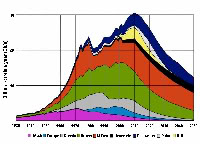Another Startling New Report Suggests World Oil Reserves are at a ‘Tipping Point’ – Guest Blogger Kathy Heshelow


It seems the peak oil situation is starting to be noticed and recognized more generally, though alarms have been sounded for decades from some very notable sources. The stress of the situation includes:
1) Renewable energy provides only about 7% of all of the energy needs in the US and it is not ramping up as fast as it should;
2) As oil peaking starts to be felt worldwide, the US (whose oil production peaked in the 1970’s) will see higher prices that will reverberate through the economy and affect our daily lives and security;
3) We have no strong national energy-efficiency policy in place to conserve what little we do have;
4) We have no national energy policy.
According to Sir David King, Director of Oxford’s Smith School, “We have to face up to a future of oil uncertainty — much like the global economic uncertainty we have faced during the past two years. The challenge will have a longer term effect on our economics unless swift action is taken by governments and business. We all recognize that oil is a finite resource.” (ScienceDaily. “World Oil Reserves at ‘Tipping Point’”. March 26, 2010).
As reported on this blog and elsewhere a few weeks ago, a Kuwait University team led by Dr. Ibrahim Nashawi recently announced the results of its peak oil research. They updated and modernized the Hubbert model. The team states that world conventional crude oil will peak as early as 2014 (published in the American Chemical Society’s magazine Energy & Fuels.)
Peak oil is of concern to everyone. Petroleum provides about an average of 40% of the global energy (higher use in some countries, lower in others) but more than 90% of transportation energy. The US has about 2 percent of the world’s oil reserves but consumes about 25 percent of the world’s oil, according to the Energy Information Agency.
Oil Era
World War I marked the beginning of the true oil era, when the commodity began to play an important role. ARC Financial’s Chief Energy Economist Peter Tertzakian has pointed out that the British went to France with 827 motorcars and 15 motorcycles. By the end of the war, the Brits had 56,000 trucks, 23,000 automobiles and 34,000 motorcycles. Oil was essential to them, and the U.S. entry to the war helped tip the balance for the Allies, partly due to oil. Lord Curzon famously said, “The Allies floated to victory on a wave of oil”.
The post World War II US believed oil would always be abundant and unlimited, and the US oil companies dominated. Economic growth can be attributed in part to the role of oil. At that point, more than half of the world’s reserves were controlled by the US — as compared to less than about 6% worldwide today. U.S. oil companies produced 45% of foreign oil in the 1950’s but today less than 10%. The largest American oil company, Exxon Mobil, is only the 14th largest worldwide, dwarfed by the large (state-owned) companies today internationally. Most notably, American dependence on foreign oil was only 10% as late as 1970, but today is in the range of 65% to 70%.
Paul Roberts wrote in his book, The End of Oil, “Historically, shifts from one energy technology to another have proved wrenching. The leaps from wood to coal, and from coal to oil caused economic disruption and political uncertainty (sixteenth century Englishmen nearly revolted at having to burn coal instead of wood). And these were fairly slow-motion transitions…Given that today’s infrastructure is even more intertwined with global economics and politics and culture, would a fundamental change in our energy technology be even more disruptive?…Will we be richer or poorer, more powerful or more hampered, happier with advanced technologies or bitter over our memories of a bygone golden age?”
What is our Energy Future?
How will the transition from oil to other energies play out over the coming decades? Renewable energy is sure to grow with the current stimulus funding and development projects, but we have an incredibly long way to go — and still no sustainable long-term energy policy. Oil still holds a place of power worldwide. For how long?

Faith-based economics in two graphs:
http://resourceinsights.blogspot.com/2010/04/faith-based-economics-in-two-graphs.html